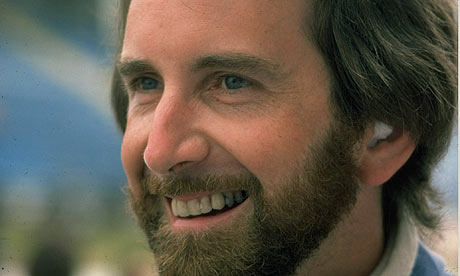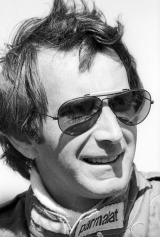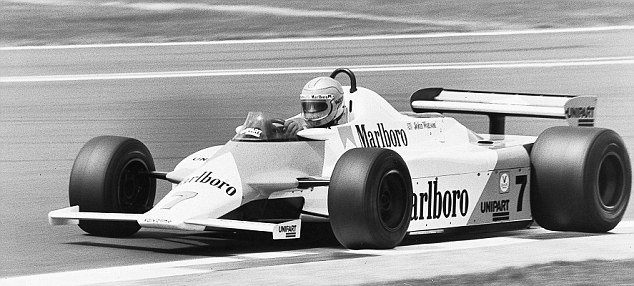When I first started taking a serious interest in F1 in 1980 John Watson was driving a very un-competitive McLaren M29 and was partnered with a young driver, fresh from F3, called Alain Prost who was showing him a clean pair of heels. I didn't take much notice of this bloke at the back and had no idea of his history in F1.
Come 1981 John led the non-championship South African GP for a few laps as other drivers stopped for fresh tyres in a wet dry race and all of a sudden the specialist magazines were full of articles about this softly spoken Ulsterman who would be team leader of the new McLaren team under the stewardship of Ron Dennis. A few races into 1981 the McLaren MP4 appeared and things changed, but I'm getting ahead of myself.
I can't find a lot about John's career pre F1 but there are plenty of stats for when he made it into the top series. Apparently John paid his own way into an F1 car (not another bloody pay driver!) and drove a coupe of races for MRD, or Brabham as more will know them, in 1973. For 1974 John raced the privately entered Brabham's of Goldie Hexagon Racing and finished the season with 6 points, not a bad result for a private team.
In 1975 Wattie (as he must be called) drove for Surtees, Lotus and Penske with very little success. Penske kept Wattie on for 1976 and after a couple of third places in Germany and Britain John won his first race (and Penske's one and only race win) in Austria. See if you can spot the difference before and after his race win:


Yes, I know in the second image he's in Brabham overalls but, trust me, he celebrated his race win my removing the face fungus. I may be wrong but the next man to win a race with a beard (or something approaching a beard anyway) was Jenson Button at Hungary in 2006.
Anyway, the second image leads me nicely into Wattie's Brabham years. The Brabham's of 1977 and 1978 were fast. The problem was that this was the beginnings of ground effect and try as you might it's difficult to build venturi tunnels into a car with a flat 12 engine. John nearly won the French GP, losing the race win on the final lap to Mario Andretti as he developed fuel metering problems. In 1978 Ferrari refuge Niki Lauda joined Brabham, a pairing which was to be repeated later at McLaren. Brabham won only one race in 1978 with Lauda winning in Sweden with the now infamous fan car on it's one and only outing.
For 1979 Wattie was at McLaren. What a dream move! After the all conquering M23 McLaren had built the race winning M26 and then along came the ground effect M28, which went through three specification changes during the season and was still crap. I have to admit that this make it pretty high up on my list of the ugliest F1 cars ever made, thank you Gordon Coppuck for this abomination.

John did manage one podium finish and a handful of other points scoring results but it was pretty meagre fare. 1980 wasn't a great deal better and, as mentioned previously, Alain Prost now sat in the second car and the Jockey got all the rave reviews especially as he scored a point in his first race in F1. That said, John managed a couple of 4th places in the "not quite as dreadful as the M28, M29" and then watched as Renault poached Prost for 1981. He was left to see what Ron Dennis would do with McLaren.
I think many of you will know the story from here on in. Three races into the season McLaren introduced the MP4 (now referred to as the MP4/1). This was the first full carbon fiber F1 car and, with Marlboro money sloshing about, Ron and John Barnard set new levels for others to aim for in F1 car construction. Wattie reveled in having a competitive car and, although by no means the fastest driver on the grid, his consistency was such that he won the British GP after all the turbo cars had consumed themselves. This following 3rd and 2nd places in Spain and France

Whilst John was having a good time in the new McLaren his team mate, Andrea de Cesaris, was proving anyone who doubted the strength of the carbon fiber chassis very wrong indeed. John scored 27 points over the season, including another visit to the podium with a second in Canada, de Cesaris failed to finish 8 times out of 15 races.
This brings us, logically, to the bizarre season that was 1982. Wattie won 2 races this season, including a win from 17th on the grid in Detriot, and going in to the final race at Caesars Palace was still in with a shout for the title. You could argue that without the disqualification of Piquet and Rosberg in Brazil, for their cars being underweight ,John wouldn't have been anywhere close to the title as nearly all the Cosworth powered teams we running the same scam as Brabham and Williams but this is F1 and there is no logic to the decisions made by the governing body and there never has been. Wattie ended up third in the driver championship with a second place in Las Vegas as Champion Keke Rosberg came home 5th to take the title. Bizarrely, second in the drivers rankings was Didier Pironi who didn't race in the last four Grand's Prix after a career ending accident in Germany.
1982 also saw the return of Niki Lauda as John's team mate, coming out of retirement to earn a few quid to prop up his airline. Niki won two races as well and McLaren were second behind Ferrari in the constructors championship. Ron Dennis seemed to have made quite a difference to the team.
In 1983 if you didn't have a turbo engine your really weren't at the game. However, the turbo's were still fragile and on some circuits the old faithful DFV (now called the DFY for some reason) could still mix it, especially when tyres were almost as important as the motor behind you. At Long Beach Watson and Lauda qualified 22nd and 23rd respectively, mainly down to the inability of their normally aspirated car to "switch on" the Michelin Q tyres. Come the race, if you didn't have Michelin rubber you may as well have got out and run around the track. Watson and Lauda came through the field to finish 1-2 with only Rene Arnoux on the same lap and he was a minute and a quarter behind the McLarens. Wattie holds the record for a race win from the lowest starting grid position, a record I suspect will never be broken (especially as we can't even manage 22 cars in F1 today). Just to show how bad the McLaren's were on Michelin Q tyres, neither driver qualified for the race in Monaco.
Turbo power arrived at the end of 1983 with the Porsche built Tag engines. Wattie must have seen the writing on the wall when the first turbo can was handed to Lauda despite John leading him by some margin in the drivers championship table. During the off season of 1983 Renault and Alain Prost had a "falling out" and, with Ron Dennis not one to miss out on a good driver, promptly dropped Watson in favour of the Frenchman.
John got one final outing in an F1 car at the European GP at Brands Hatch in 1985, proudly driving car No.1 to a 7th place finish.
After F1 Wattie raced sports cars winning 3 races in the Jaguar team in 1987.
Most will now know Wattie as a commentator and "super pundit", wheeled out whenever the BBC want a blunt comment. He still continues to commentate on some GT races and although it's been a while since he raced competitively I still find his insights very useful to someone who has only ever seen a race car from the outside.
John Watson won 5 Grands Prix, took a couple of pole positions and 5 fastest laps. I'm not sure if the gap between his first win in 1976 and his second in 1981 is the longest between wins but it must be up there. I will always remember him as a very honest driver and commentator and thoroughly enjoyed watching him win, as a callow youth, at Silverstone in 1981.
Come 1981 John led the non-championship South African GP for a few laps as other drivers stopped for fresh tyres in a wet dry race and all of a sudden the specialist magazines were full of articles about this softly spoken Ulsterman who would be team leader of the new McLaren team under the stewardship of Ron Dennis. A few races into 1981 the McLaren MP4 appeared and things changed, but I'm getting ahead of myself.
I can't find a lot about John's career pre F1 but there are plenty of stats for when he made it into the top series. Apparently John paid his own way into an F1 car (not another bloody pay driver!) and drove a coupe of races for MRD, or Brabham as more will know them, in 1973. For 1974 John raced the privately entered Brabham's of Goldie Hexagon Racing and finished the season with 6 points, not a bad result for a private team.
In 1975 Wattie (as he must be called) drove for Surtees, Lotus and Penske with very little success. Penske kept Wattie on for 1976 and after a couple of third places in Germany and Britain John won his first race (and Penske's one and only race win) in Austria. See if you can spot the difference before and after his race win:


Yes, I know in the second image he's in Brabham overalls but, trust me, he celebrated his race win my removing the face fungus. I may be wrong but the next man to win a race with a beard (or something approaching a beard anyway) was Jenson Button at Hungary in 2006.
Anyway, the second image leads me nicely into Wattie's Brabham years. The Brabham's of 1977 and 1978 were fast. The problem was that this was the beginnings of ground effect and try as you might it's difficult to build venturi tunnels into a car with a flat 12 engine. John nearly won the French GP, losing the race win on the final lap to Mario Andretti as he developed fuel metering problems. In 1978 Ferrari refuge Niki Lauda joined Brabham, a pairing which was to be repeated later at McLaren. Brabham won only one race in 1978 with Lauda winning in Sweden with the now infamous fan car on it's one and only outing.
For 1979 Wattie was at McLaren. What a dream move! After the all conquering M23 McLaren had built the race winning M26 and then along came the ground effect M28, which went through three specification changes during the season and was still crap. I have to admit that this make it pretty high up on my list of the ugliest F1 cars ever made, thank you Gordon Coppuck for this abomination.

John did manage one podium finish and a handful of other points scoring results but it was pretty meagre fare. 1980 wasn't a great deal better and, as mentioned previously, Alain Prost now sat in the second car and the Jockey got all the rave reviews especially as he scored a point in his first race in F1. That said, John managed a couple of 4th places in the "not quite as dreadful as the M28, M29" and then watched as Renault poached Prost for 1981. He was left to see what Ron Dennis would do with McLaren.
I think many of you will know the story from here on in. Three races into the season McLaren introduced the MP4 (now referred to as the MP4/1). This was the first full carbon fiber F1 car and, with Marlboro money sloshing about, Ron and John Barnard set new levels for others to aim for in F1 car construction. Wattie reveled in having a competitive car and, although by no means the fastest driver on the grid, his consistency was such that he won the British GP after all the turbo cars had consumed themselves. This following 3rd and 2nd places in Spain and France

Whilst John was having a good time in the new McLaren his team mate, Andrea de Cesaris, was proving anyone who doubted the strength of the carbon fiber chassis very wrong indeed. John scored 27 points over the season, including another visit to the podium with a second in Canada, de Cesaris failed to finish 8 times out of 15 races.
This brings us, logically, to the bizarre season that was 1982. Wattie won 2 races this season, including a win from 17th on the grid in Detriot, and going in to the final race at Caesars Palace was still in with a shout for the title. You could argue that without the disqualification of Piquet and Rosberg in Brazil, for their cars being underweight ,John wouldn't have been anywhere close to the title as nearly all the Cosworth powered teams we running the same scam as Brabham and Williams but this is F1 and there is no logic to the decisions made by the governing body and there never has been. Wattie ended up third in the driver championship with a second place in Las Vegas as Champion Keke Rosberg came home 5th to take the title. Bizarrely, second in the drivers rankings was Didier Pironi who didn't race in the last four Grand's Prix after a career ending accident in Germany.
1982 also saw the return of Niki Lauda as John's team mate, coming out of retirement to earn a few quid to prop up his airline. Niki won two races as well and McLaren were second behind Ferrari in the constructors championship. Ron Dennis seemed to have made quite a difference to the team.
In 1983 if you didn't have a turbo engine your really weren't at the game. However, the turbo's were still fragile and on some circuits the old faithful DFV (now called the DFY for some reason) could still mix it, especially when tyres were almost as important as the motor behind you. At Long Beach Watson and Lauda qualified 22nd and 23rd respectively, mainly down to the inability of their normally aspirated car to "switch on" the Michelin Q tyres. Come the race, if you didn't have Michelin rubber you may as well have got out and run around the track. Watson and Lauda came through the field to finish 1-2 with only Rene Arnoux on the same lap and he was a minute and a quarter behind the McLarens. Wattie holds the record for a race win from the lowest starting grid position, a record I suspect will never be broken (especially as we can't even manage 22 cars in F1 today). Just to show how bad the McLaren's were on Michelin Q tyres, neither driver qualified for the race in Monaco.
Turbo power arrived at the end of 1983 with the Porsche built Tag engines. Wattie must have seen the writing on the wall when the first turbo can was handed to Lauda despite John leading him by some margin in the drivers championship table. During the off season of 1983 Renault and Alain Prost had a "falling out" and, with Ron Dennis not one to miss out on a good driver, promptly dropped Watson in favour of the Frenchman.
John got one final outing in an F1 car at the European GP at Brands Hatch in 1985, proudly driving car No.1 to a 7th place finish.
After F1 Wattie raced sports cars winning 3 races in the Jaguar team in 1987.
Most will now know Wattie as a commentator and "super pundit", wheeled out whenever the BBC want a blunt comment. He still continues to commentate on some GT races and although it's been a while since he raced competitively I still find his insights very useful to someone who has only ever seen a race car from the outside.
John Watson won 5 Grands Prix, took a couple of pole positions and 5 fastest laps. I'm not sure if the gap between his first win in 1976 and his second in 1981 is the longest between wins but it must be up there. I will always remember him as a very honest driver and commentator and thoroughly enjoyed watching him win, as a callow youth, at Silverstone in 1981.

